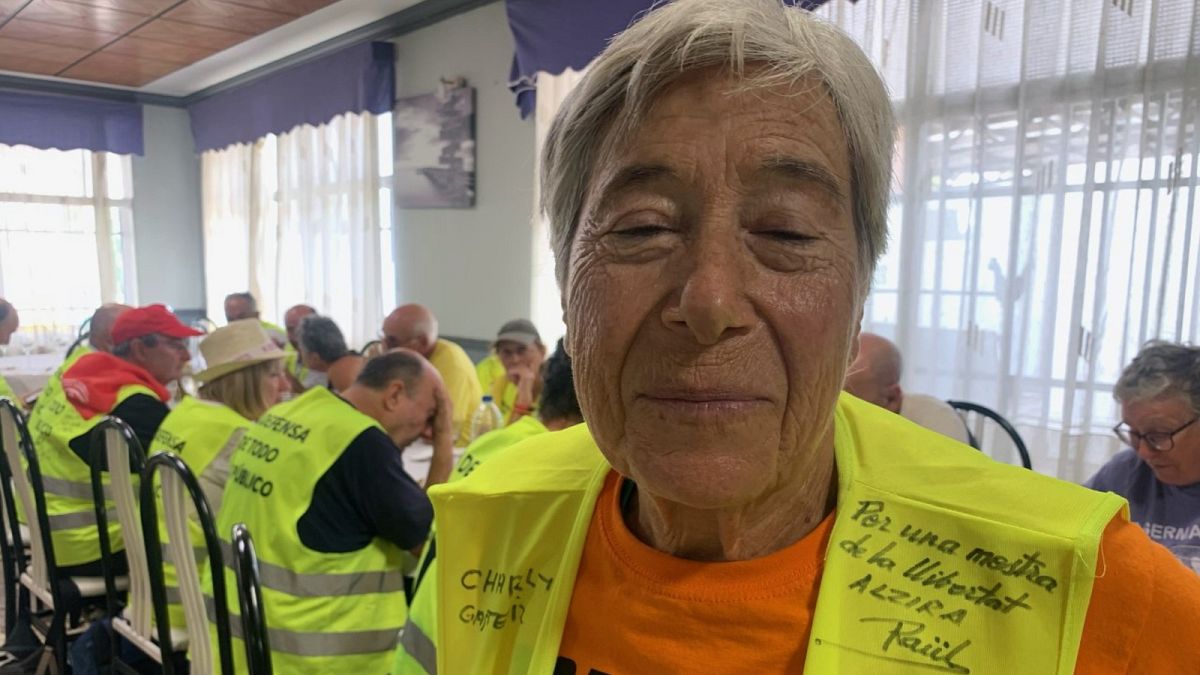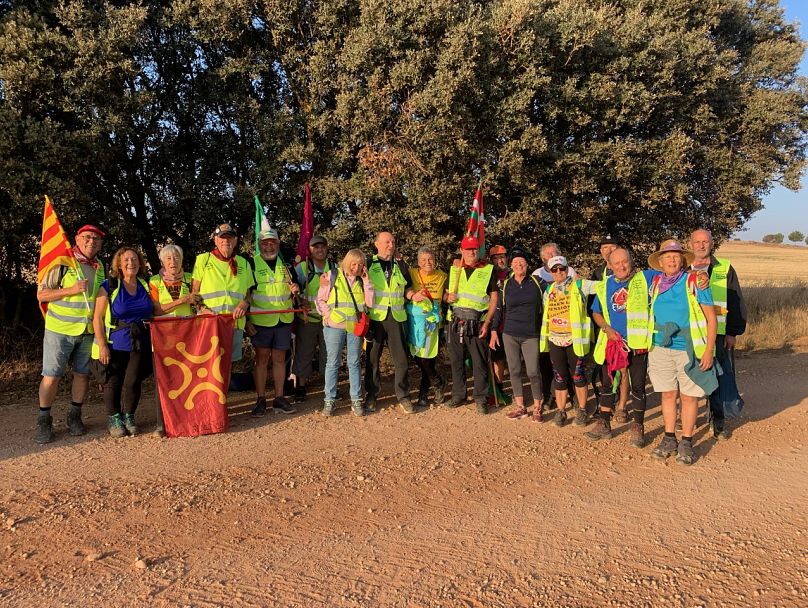They are marching from Valencia to Madrid to "defend the right to decent wages and pensions" at a protest on 15 October.
At half past six the alarm clock goes off, they pick up their sleeping bags, put on their trainers and before setting off someone remarks: "Don't forget to take your blood pressure pills!"
After a short breakfast to recharge their batteries, this group of pensioners, with an average age of 72 years, sets off again.
It's a 300-kilometre walk from where they set off in Valencia to the Spanish capital Madrid, and it means they'll have to cover up to 30 kilometres per day in "infernal heat" if they want to arrive in time for a big demonstration against welfare budget cuts on 15 October.
The epic "adventure" for the group of 22 pensioners is important, they say, to defend the right to decent wages and pensions, and to take a stand against the dismantling of Spain's social welfare infrastructure.
The march comes with price inflation at 9.3% in the 12 months to September, according to the latest data, down a percentage point due to a transport price cut and electricity price slowdown.
Madrid says €6 out of every €10 in its 2023 budget plans will go towards social spending, which, according to Spain's prime minister Pedro Sanchez is the most allocated for this purpose in the country's history.
'I don't like walking'
After ten days of walking, the physical fatigue is beginning to show, but the mood among the pensioners is not flagging.
Luisa, 83, is still going strong despite the exertion.
"I don't like walking at all," she told Euronews from a service area in Castilla-La Mancha, where the group have stopped for a break.
In her home city of Barcelona, Luisa attends pilates classes and continues to swim as much as she can in the sea, but she doesn't care so much for the long hours of walking.
"From the moment I see the town in the distance until we get there, it takes forever, but then when we get there we rest so the fatigue doesn't build up," she said.
Luisa explained she's doing the walk for Spain's next generation, so that younger people can look forward to a pension of their own when they retire - and for the elderly so that they have a decent pension to live on.
"The majority of pensioners do not receive €900 and, in the case of women, the figure drops to €600. Whoever governs, pensions must be defended and the fight is the only way forward," she says.
Every evening along the route of the march the pensioners are giving talks to raise awareness with local audiences too, trying to win others over to their cause.
The most recent talk was in a secondary school with economics students to explain the public pension system; while in the town of Motilla del Palancar, they convinced the mayor's office to charter a bus for those who want to attend the demonstration in Madrid.
Pensioners hope to increase their number on way to Madrid
The march has not been without its complications: one of the original 26 walkers had to pull out after receiving health test results.
He was in tears as he left the group in Valencia and returned back home.
"The idea is to be 50 when we get to Madrid," said Amelia, 71, from Tenerife, talking about the 22-strong group.
"We are quite well organised, we have two support vans to carry our backpacks and some food for the breaks along the way.
"Yesterday the sole of my foot was broken after walking 5 kilometres, so I got into the van to rest for a while and then joined the march again.
"We know what we've come for, but the good thing is that we have support."
The group spends nights in sports centre, sleeping on inflatable mattresses or simply with a sleeping bag and a mat.
They are fed by locals or get discounted meals at nearby restaurants.
'Many have to choose between medicine, food or heating'
Not even the government's latest proposal -- that contributory and non-contributory pensions will be increased by 8.5% from next year -- has been enough to stop the pensioners' march to protest.
For Luis, a 65-year-old from Alicante and one of the marching pensioners, Madrid's move was simply a tactic to stop them in their tracks.
"Until the budgets are approved we won't know if this will go ahead," he said. "As long as we don't see it reflected, it seems to us like a siren song. Last year we already had a 3% loss of purchasing power and this year we will have to add another 2%.
"The public pension system is at stake, the pay-as-you-go system that means pensions for everyone and not just for those who can afford a private pension plan."
"In normal conditions, we already have a pittance of pensions, so imagine now with inflation running rampant and the price of gas skyrocketing," said Amelia. "A pensioner has a very hard time. There are many who have to choose between medicine, food or heating."
The whole group wonders how the government can say that there is no money to pay pensions when they are talking about increasing defence spending.
With this question on the table, the pensioners got up to resume their march.
"If there is one thing we have plenty of at the moment, it is time and patience, so we are going to keep fighting until we get it."



